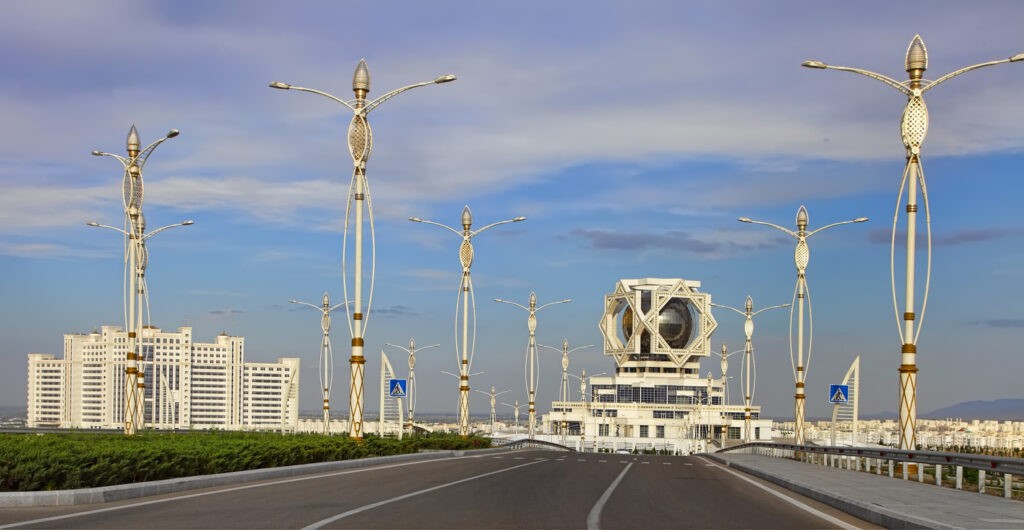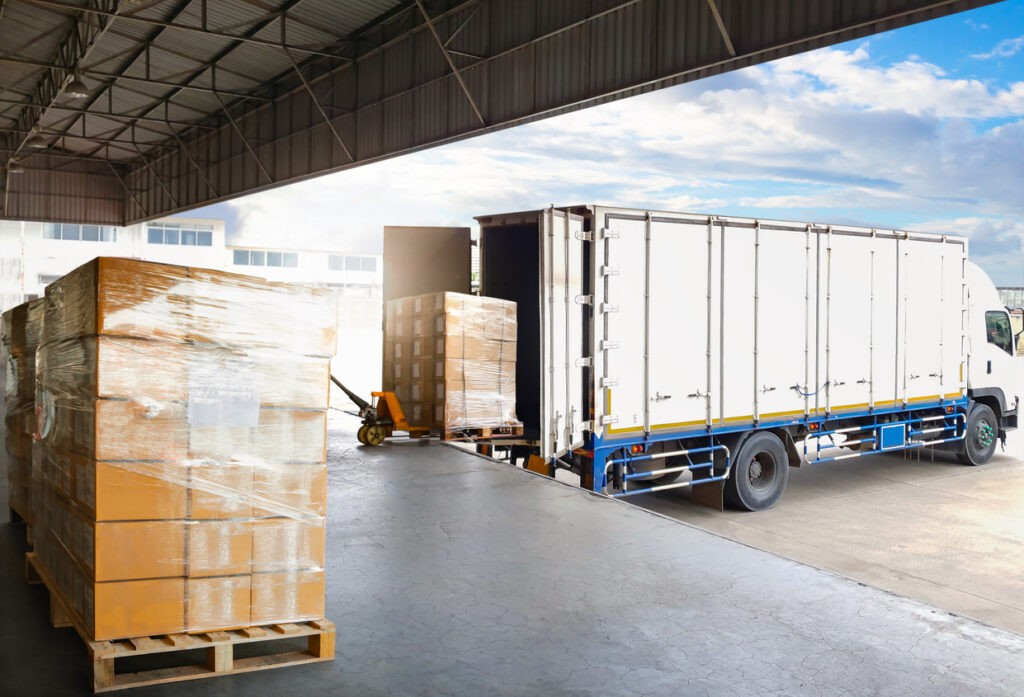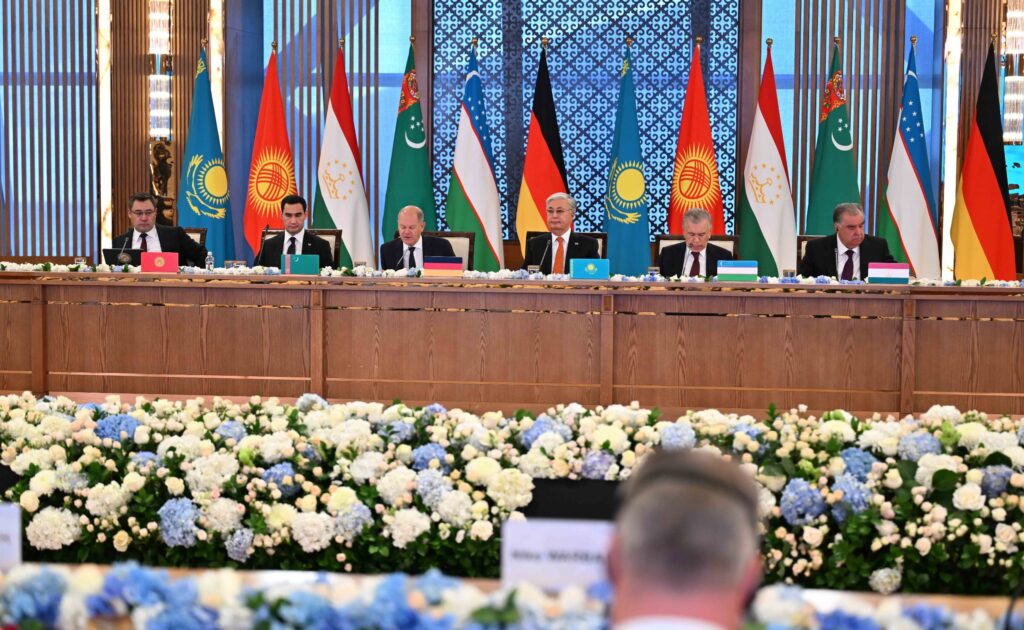BISHKEK (TCA) — The Publisher’s note: Throughout the 19th and 20th centuries, Central Asia was the scene of intense geopolitical struggle and the Great Game between the British and Russian Empires, and later between the Soviet Union and the West, over Afghanistan and neighboring territories. Into the 21st century, Central Asia has become the area of a renewed geopolitical interest, dubbed the New Great Game, largely based on the region’s hydrocarbon and mineral wealth. On top of that, the region now is perhaps the most important node in the implementation of China’s One Belt, One Road initiative through which Beijing aims to get direct access to Western markets. Every week thousands of news appears in the world’s printed and online media and many of them may escape the attention of busy readers. At The Times of Central Asia, we strongly believe that more information can better contribute to peaceful development and better knowledge of this unique region. So we are presenting this Weekly Digest which compiles what other media have reported on Central Asia over the past week.
KAZAKHSTAN
China’s Belt and Road initiative, explained by Kazakhstan
Deputy minister of foreign affairs of Kazakhstan spoke to foreign journalists about his country’s development and the China-promoted Belt and Road initiative
July 4 — “This week Astana is hosting a number of international events and has attracted many journalists. Vassilenko, who is a career diplomat, having served in the UK and in the US, spent two and a half hours with reporters and answered many questions. The diplomat said he had received many questions in advance concerning the Belt and Road initiative, and made use of a map to offer explanations.” READ MORE: https://www.euractiv.com/section/central-asia/news/chinas-belt-and-road-initiative-explained-by-kazakhstan/
Kazakhstan is throttling the internet when the president’s rival is online
Authorities in Kazakhstan have applied the internet censorship in order to prevent the spread of opposition ideas via social media, to the irritation of many internet users who do not share any opposition moods
July 4 — “Every evening for the past four months, social media websites have become largely unusable for many people in Kazakhstan. After 8 p.m., for a couple of hours, just as many people are winding down from a day at work, popular sites like Facebook, YouTube, Twitter and messaging apps like Telegram work either slowly or not at all.” READ MORE: https://timesca.com/index.php/news/19957-kazakhstan-is-throttling-the-internet-when-the-president-s-rival-is-online
UAE, Kazakhstan explore investment plans
There is strong UAE interest in investing in Kazakhstan, which will drive forward the growing volume of investments between the two nations
July 4 — “His Highness Shaikh Mohammad Bin Zayed Al Nahyan, Abu Dhabi Crown Prince and Deputy Supreme Commander of the UAE Armed Forces, on Wednesday held talks with Nursultan Nazarbayev, President of Kazakhstan, during his official visit to Astana.” READ MORE: https://gulfnews.com/news/uae/government/uae-kazakhstan-explore-investment-plans-1.2246854
Seeking Belt buckle role, Kazakhstan launches China-backed financial hub
The Astana International Financial Centre (AIFC) is part of Kazakhstan’s ambition to become a Luxembourg-style intermediary between larger nations and a gateway for foreign investment in Central Asia
July 5 — “Seeking to attract more foreign investment from its prime position in China’s huge Belt and Road trade project, Kazakhstan launched a new financial hub on Thursday which has already secured the backing of its giant neighbor.” READ MORE: https://www.reuters.com/article/us-kazakhstan-aifc/seeking-belt-buckle-role-kazakhstan-launches-china-backed-financial-hub-idUSKBN1JV1CG
KYRGYZSTAN
Kyrgyzstan’s Air Manas Targets Beijing Route Launch
Landlocked Kyrgyzstan badly needs to improve its air communication with the rest of the world
June 29 — “Air Manas is seeking permission to launch passenger flights between the capitals of Kyrgyzstan and China. “We can fly to Beijing. We are looking for the opportunities for that and for the permits,” confirmed Mehmet Nane, chief executive of Pegasus Airlines, the Turkish low-cost carrier that owns 49% of Air Manas.” READ MORE: https://www.forbes.com/sites/martinrivers/2018/06/29/kyrgyzstans-air-manas-targets-beijing-route-launch/#2a44f8284769
Kyrgyzstan: wrong agreements and poor management affect the energy sector
Against the latest developments in the energy sector (arrests of top managers accused of corruption), the Kyrgyz society has low confidence in this economic sector
July 2 — “RusHydro, one of the largest Russian power generation companies, has notified Kyrgyzstan about the preparation of a lawsuit at the Hague court concerning the Upper Naryn cascade of hydroelectric power plants, Russian media reported. At the invitation of the Kyrgyz side, a RusHydro delegation plans to visit Kyrgyzstan for negotiations in the coming days, the company’s head Nikolay Shulginov said.” READ MORE: https://timesca.com/index.php/news/19948-kyrgyzstan-wrong-agreements-and-poor-management-affect-the-energy-sector
Kyrgyzstan grows wary of China amid corruption probe
Kyrgyzstan’s president is taking efforts to maintain and improve ties with China as his country’s debts to Beijing grow
July 4 — “Kyrgyzstan is growing increasingly wary of China as details of a corruption case involving a project linked to Beijing are revealed. The country is heavily indebted to China and is now working to rebalance its diplomacy, moving closer to its neighbors.” READ MORE: https://asia.nikkei.com/Politics/International-Relations/Kyrgyzstan-grows-wary-of-China-amid-corruption-probe
Kyrgyzstan eyes to cover deficit of oil products at expense of Kazakhstan, Russia
Kyrgyzstan is heavily dependent on motor fuel imports from Russia and Kazakhstan
July 5 — “Kyrgyzstan may face a shortage of oil products in the coming months, the State Committee for Industry, Energy and Subsoil Use of the country said in a statement. The volume of oil products, which should be delivered duty-free to Kyrgyzstan within the current indicative balance, includes 176,000 tons of gasoline and 64,500 tons of diesel fuel as of the beginning of July, the state committee said in a statement.” READ MORE: https://www.azernews.az/region/134385.html
TAJIKISTAN
Dreams Of Change Deferred: Activists Can’t Work In Tajikistan, Can’t Live Outside It
In Tajikistan, any dissent or opposition activism is possible if one is self-exiled abroad, and return back home would mean prosecution and persecution by the authorities
July 3 — “Faizullo Safarov always dreamed of changing the world, or at least the world around him. For Safarov, who grew up in a small village in Tajikistan’s southern Yovon district, that meant pushing for big changes in a country struggling to make the transition to democracy. Now 31, he recalls leaving university and being disheartened by the corruption, the state of education, and the unemployment that led so many of his young countrymen to go abroad in search of a better future.” READ MORE: https://www.rferl.org/a/dreams-of-change-deferred-activists-can-t-work-in-tajikistan-can-t-live-outside-it/29336596.html
GM Uzbekistan’s cars worth $1.3M sold in Tajikistan
Uzbekistan-made cars become increasingly popular in neighboring Central Asian countries and Russia
July 4 — “The Uzbek-American automobile enterprise, GM Uzbekistan, has sold cars for $ 1.3 million in Tajikistan since September 2017, Uzbek media outlets reported. “GM Uzbekistan is working hard to consistently develop partnership relations between Uzbekistan and Tajikistan. In 2017, the Uzbek car was first introduced in Tajikistan as part of the Made in Uzbekistan exhibition and the Uzbek-Tajik joint business forum in Dushanbe.” READ MORE: https://www.azernews.az/region/134311.html
Detailing an Arbitrary Detention in Tajikistan
Human rights advocates say Tajikistan has been clever to couch its crackdowns on opposition activists in national security terms, effectively neutering international responses to repeated violations
July 6 — “A UN body concluded in May that the detention of Mahmadali Hayit by Tajikistan is arbitrary. Hayit, a deputy chairman of the Islamic Renaissance Party of Tajikistan (IRPT), was given a life sentence in 2016 after being charged along with a dozen other IRPT leaders with various crimes, including attempting to overthrow the state.” READ MORE: https://thediplomat.com/2018/07/detailing-an-arbitrary-detention-in-tajikistan/
TURKMENISTAN
Turkmenistan’s Uzbek Problem
There are no reliable official figures on ethnic Uzbeks living in Turkmenistan, but the percentage of ethnic Uzbeks among Turkmenistan’s population is probably a bit less than 10 percent
June 28 — “Might there be a little friction in Turkmen-Uzbek ties? Uzbek state television recently reported on food shortages in Turkmenistan. The thing is, Turkmen state media have not only avoided mentioning those shortages for many months, they even attempted to mask them just one day before the Uzbek reports by suggesting there was great availability of food in Turkmenistan.” READ MORE: https://www.rferl.org/a/turkmenistan-s-uzbek-problem/29325881.html
Making dynastic rule fashionable again: the case of Turkmenistan
The state power succession is a relevant issue in Central Asian countries, but Turkmenistan, as well as Tajikistan, seems to have chosen a dynastic rule scheme
July 1 — “Dynastic rule is coming back into fashion in Central Asia. And the more consolidated the authoritarian regime, the more openly the grooming of a successor can take place. This maxim appears to be bearing itself out in both Turkmenistan and Tajikistan. Preparing for a family member to take over the presidential throne can be fraught with risks, however.” READ MORE: https://timesca.com/index.php/news/19943-making-dynastic-rule-fashionable-again-the-case-of-turkmenistan
Turkmenistan: The art of flattery
In its ‘Akhal-Teke: A Turkmenistan Bulletin’, Eurasianet reviews the main news and events in the Central Asian country for the previous week
July 3 — “When the history books are written at the end of time, it may well be recalled that there was never a court flatterer more sycophantic and craven than Turkmenistan’s own Gozel Shagulyeva. Shagulyeva added to her voluminous toadeating poetic oeuvre this week with verses composed in honor of President Gurbanguly Berdymukhamedov’s 61st jubilee.” READ MORE: https://eurasianet.org/s/turkmenistan-the-art-of-flattery
UZBEKISTAN
Uzbekistan to allow citizens to open accounts in foreign banks
Uzbekistan is taking one more step towards liberalization of its financial system
July 2 — “Citizens of Uzbekistan will be able to open and use accounts in foreign banks, the draft presidential decree “On Currency Regulation and Currency Control”, published on the portal for discussion of regulatory legal acts in Uzbekistan read.” READ MORE: https://en.trend.az/business/economy/2923594.html
Uzbekistan to apply zero duty on import of certain cars
From January 1, 2019, Uzbekistan will apply a zero customs duty on electric vehicles
July 4 — “Uzbekistan will abolish customs duties for two types of vehicles (cars) starting from 2019. Uzbek President Shavkat Mirziyoyev signed a resolution “On measures to further streamline foreign economic activity and improve the system of customs and tariff regulation of the Republic of Uzbekistan” on June 29.” READ MORE: https://www.azernews.az/region/134314.html
Presidential Decree Sets the Stage for Legalizing Cryptocurrencies in Uzbekistan
Uzbekistan has taken steps to legalize its crypto sector as part of the efforts by the government to boost the country’s development through innovation
July 5 — “The executive power in Uzbekistan has advanced towards legalizing cryptocurrencies and implementing blockchain technology in both government and economy. A new decree signed by President Mirziyoyev mandates licensing for trading and other activities related to the circulation of digital coins. The document also calls for regulating crypto mining and smart contracts.” READ MORE: https://news.bitcoin.com/presidential-decree-sets-the-stage-for-legalizing-cryptocurrencies-in-uzbekistan/
Many Questions Remain After Uzbekistan Fines US Citizen Over Alleged IMU Links
Uzbekistan historically has resorted to heavy-handed rulings in cases related to terrorism, the IMU especially, making the $67 fine remarkable
July 6 — “Zokir Aliev, a U.S. citizen since 2014 who traveled to Uzbekistan to visit relatives, was detained in mid-June and accused of having links to a terrorist group. On July 4, a provincial court turned in a guilty verdict and levied a $67 fine on Aliev. Aliev was arrested shortly after arriving in Qarshi in the southern Qashqadaryo Region.” READ MORE: https://thediplomat.com/2018/07/many-questions-remain-after-uzbekistan-fines-us-citizen-over-alleged-imu-links/
AFGHANISTAN
A Vietnam “Solution” to the Afghanistan War?
The January 1973 agreement between North Vietnam and the United States can be applied to the present, stalemated situation in Afghanistan
July 1 — “It was in 2010 that United States President Barack Obama told an interviewer that he could easily imagine a situation in which “we ended up staying in Afghanistan for another five years, another eight years, another ten years. And we would do it not with clear intentions but rather just out of an inertia.” Last year, well into that decade of inertial guidance, President Donald Trump, although noting that his “original instinct was to pull out,” authorized an increase of a few thousand American troops to the war in Afghanistan.” READ MORE: http://nationalinterest.org/feature/vietnam-“solution”-afghanistan-war-24737
Afghan Peace Must Be Complimented By Economic Opportunities To Achieve Stability – OpEd
To ensure stability and continued peace in Afghanistan, a comprehensive action plan to create economic opportunities and jobs must be prepared and implemented simultaneously with a possible peace deal, Afghanistan’s former Deputy Minister of Finance believes
July 3 — “The recent announcement of a ceasefire by the Afghan government and then Taliban agreement to a Three-day ceasefire is rather encouraging and hopeful of a long-term peace deal. It is a great opportunity for the world community involved in Afghanistan to strongly support the ceasefire and encourage the Taliban and Afghan government to extend the ceasefire and pave the way for negotiations.” READ MORE: https://www.eurasiareview.com/03072018-afghan-peace-must-be-complimented-by-economic-opportunities-to-achieve-stability-oped/
Why Can’t Pakistan Facilitate a Long-Term Ceasefire in Afghanistan?
One of the key reasons why Pakistan doesn’t have enough leverage to compel the Taliban into accepting a long-term ceasefire is the latter’s financial and operational independence
July 4 — “Last month, the leader of the Pakistani Taliban was killed in a drone strike in Afghanistan’s Kunar province. The drone strike that killed the former head of the Pakistani Taliban, Mullah Fazlullah, has been viewed as an attempt by Washington to repair its broken relationship with Islamabad.” READ MORE: https://thediplomat.com/2018/07/why-cant-pakistan-facilitate-a-long-term-ceasefire-in-afghanistan/
Where Did $8.2 Billion in US Aid to Fight Opiates in Afghanistan Go?
Spokesman for the Afghan Ministry of Counter Narcotics told Sputnik how the money allocated to fight drugs in Afghanistan was being spent
July 5 — “The US has spent $8.6 billion since 2001 fighting drug production in Afghanistan; however, the country remains the world’s largest producer of opium and the production keeps growing.” READ MORE: https://sputniknews.com/analysis/201807051066065197-us-aid-opiates-afghanistan/
WORLD
New Southern Gas Corridor Project Will Intensify the Regional Pipeline Race
Without participation of Turkmenistan and Iran, the Southern Gas Corridor pipeline will hardly be a real challenger to Russia’s Gazprom in the European gas market
June 28 — “On May 29, Azerbaijan’s President Ilham Aliyev officially inaugurated the first phase of the long-awaited flagship project Southern Gas Corridor (SGC), through which Caspian natural gas from the Shah-Deniz II field will be transported to Europe. The new project consists of several pipeline networks that pass through Georgia and Turkey (via the Trans-Anatolian Pipeline, TANAP) and further through Greece, Albania and Italy (via the Trans-Adriatic Pipeline, TAP). As Shah Deniz Stage 2 is implemented, gas production will increase from 9 to 25 billion cubic meters (bcm) per year.” READ MORE: http://cacianalyst.org/publications/analytical-articles/item/13526-new-southern-gas-corridor-project-will-intensify-the-regional-pipeline-race.html
Central Asia: Four ways to transform landlocked countries
Landlocked countries in Asia, including in Central Asia, face similar economic challenges such as the need of better transport connectivity and diversification, and therefore need sustained support from international donors and development partners
July 4 — “Twelve of the world’s 32 landlocked states are in developing Asia. Although they range from upper middle-income to low-income economies, they share some common features. For example, Asian landlocked countries, especially the nine in Central and East Asia, are either highly reliant on exports of primary commodities and other mineral resources, or on remittance inflows from migrants working in neighboring countries. As such, they are very vulnerable to external shocks, as has been vividly demonstrated since the mid–2014 fall in global oil prices and the economic slowdown in Central Asia.” READ MORE: https://timesca.com/index.php/news/26-opinion-head/19955-central-asia-four-ways-to-transform-landlocked-countries








